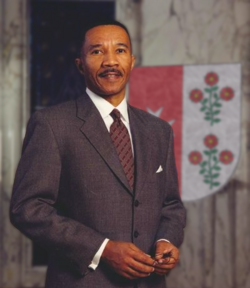Terence Cola
Terence Cola Nguema | |
|---|---|
 | |
| 28th & 31st President of Santa Rosa | |
| Assumed office 27 October 2005 | |
| Prime Minister | Marina Costanza |
| Vice President | Mick Kennedy |
| Preceded by | Antonius Fuchs (acting) |
| In office July 20, 1994 – July 20, 2002 | |
| Vice President | Geraldo Gran Cebolla |
| Preceded by | Paul Oppenheimer |
| Succeeded by | Bukar Breno Bellarosa |
| Deputy Secretary-General of APSIA | |
| In office 1 October 2002 – 22 September 2005 | |
| Secretary-General | Hadinata Gunaraksa |
| Preceded by | Jayamal al-Fayyinus |
| Succeeded by | Eliza Cortez |
| President of the National Assembly | |
| In office 20 July 1990 – 14 November 1991 | |
| Member of the National Assembly | |
| In office 20 July 1978 – 14 November 1991 | |
| Constituency | Salmos II |
| Personal details | |
| Born | Terence Galanza Cola Nguema 24 October 1948 Alhambra, Santa Rosa |
| Political party | Independent (2006–) |
| Other political affiliations | PSSR (1997–2006) PSD (until 1997) |
| Spouse | Seble Cola |
| Children | 5 |
| Education | University of Campinas (BA) Law School of Sorocaba (BL, LLD) |
| Awards | Bernstein Peace Award (1995) |
Terence Galanza Cola Nguema (born 24 October 1948) is a Santa Rosan politician and lawyer who served as the 28th President of Santa Rosa from 20 July 1994 to 20 July 2002, and the 31st President from 17 October 2006.
Early life and education
Terence Galanza Cola Nguema was born in 1948 in Alhambra, a small town in the state of Santiago. His mother and father were both farmhands and descendants of slaves. Cola attended public school, where he became involved in the Social Democratic Party's youth division. At a young age, Cola was arrested for participating in a sit-in at a whites-only restaurant. After graduating from high school, Cola went on to attend the University of Campinas where he studied political science.
After getting his degree at Campinas, Cola was motivated by his parents to attend the Sorocaba law school. Cola was accepted on a scholarship and spent four years obtaining his law degree and eventually received a doctorate.
Terence Cola received a job at a law firm specializing in racial justice after graduating in 1974. The firm initiated lawsuits against local, state, and federal governments for racial discrimination, a problem that persisted heavily in Santa Rosa's southeastern states going into the later half of the 20th century. In 1977, Cola argued successfully in the Gerhati v. Sanchez case where a Black man was refused housing presumably on the basis of his race. The case law that proceeded forbid housing discrimination based on race in Santa Rosa.
Congressional career (1978-1991)
Cola ran for the National Assembly in 1978 as a Social Democrat. In his campaign, he championed his record on civil rights and race issues and promised to bring about substantial change in the country on that issue. He defeated the Liberal Republican incumbent Jorge Mazio with 57.20% of the vote. Since then, Cola has received a majority of the vote in any election he has ran in.
Cola's landmark achievement as a National Assemblyman was the 1980 Civil Rights Act, which codified anti-racial discrimination rules into federal law.
First presidency (1994-2002)
Cola won the 1994 presidential election with 75.40% of the vote in the second round, defeating incumbent prime minister Antonio Lardesi in a landslide.
Cola was inaugurated in Ciudad Beldad on 20 July 1994.
Cabinet
Prior to forming his cabinet, Cola's Social Democratic Party (PSD) formed a congressional alliance with the Movement to Socialism (MAS) and the Communist Party of Santa Rosa (PCSR), called the Popular Front. The Popular Front was the largest political alliance of leftist parties in the history of Santa Rosa, holding 165 of the 213 seats in the National Assembly and 29 of the 42 seats in the Senate, giving the bloc a super-majority to legislate without opposition.
Leading up to the 1998 election, Cola united the Social Democratic Party and the Movement to Socialism to create the Socialist Party of Santa Rosa. Cola proceeded to win that election with 69.4% of the vote in the first round.
Personal life
Terence Cola met Seble Ybarra at the Law School of Sorocaba and the two married in 1974. The couple have had five children: Damián (b. 1975), Jovita (b. 1978), Lorenzo (b. 1980), Nia (b. 1981), and Lalo (b. 1984 d. 1998).
Awards and honours
Awards
- 1995 – Bernstein Peace Award
This article is from APSIA 1.2. For the most recent iteration of APSIA, look at Category:APSIA 2.B |
